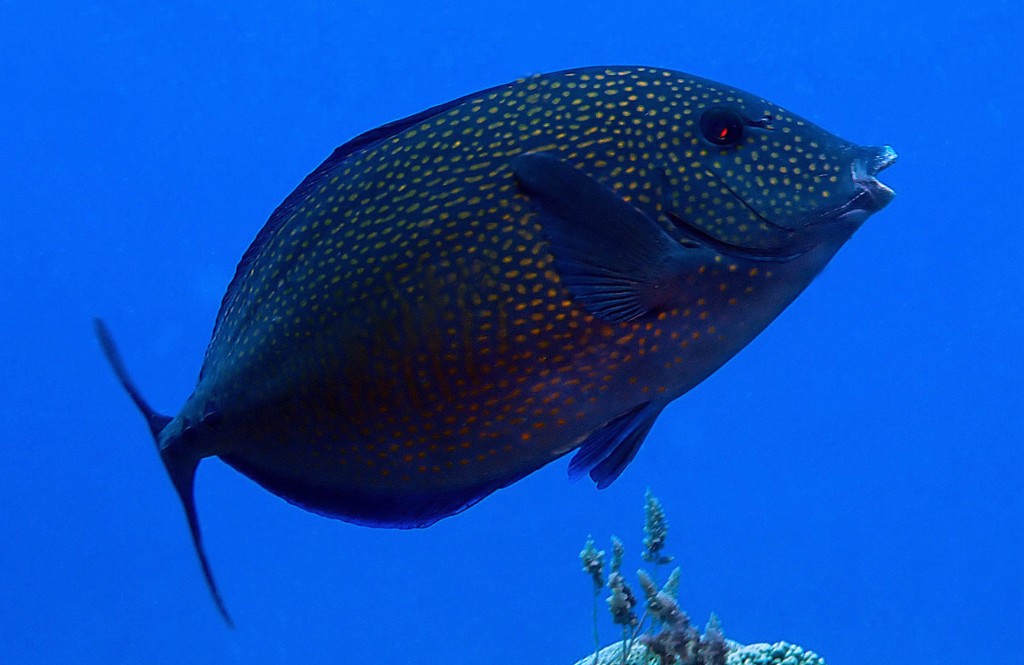PRIONURUS MACULATUS - (OGILBY, 1887)
Picture courtesy of: Johan Bas
Actinopterygii (Gigaclass) > Actinopteri (Class) > Teleostei (Subclass) > Acanthuriformes (Order) > Acanthuridae (Family) > Prionurus (Genus)
Actinopterygii (Gigaclass) > Actinopteri (Class) > Teleostei (Subclass) > Acanthuriformes (Order) > Acanthuridae (Family) > Prionurus (Genus)
Queue en scie, Spotted sawtail, Spotted sawtail surgeonfish, Yellowspotted sawtail, Spotted sawtail surgeonfish Gefleckter Doktorfisch, Pez cirujano de cola vista moteado amarillo, Pesce chirurgo dalla spina affilata, 斑多板盾尾鱼,
Description
Dorsal spines (total): 8-9; Dorsal soft rays (total): 24-26; Anal spines: 3; Anal soft rays: 23-25; Pectoral fin rays: 17-18; Pelvic fin rays: I, 5; Caudal fin rays: 17. Keeled peduncular plates usually: 3, no scattered small thorn-like plates dorsally and posteriorly to midlateral series. Max. length: 45.0 cm TL. Depth range: 0 - 20 m.
Color
Color can change quickly. Bluish grey with narrow vertical yellow bars on side of body and small yellow spots dorsally on body and on head. Keeled peduncular plates blue and black.
Etymology
Prionurus: from ancient Greek, príôn = saw + from Greek, oura = tail. Referring to 3-7 fixed, keeled bony plates on caudal peduncle.
maculatus: from Latin, maculatus = stain, make spotted. Referring to small yellow spots on head and upper sides.
Original description: Prionurus maculatus Ogilby, 1887 - Type locality: Port Jackson, New South Wales, Australia.
Distribution
Southwestern Pacific: Capricorn Group and Swains Reefs on the Great Barrier Reef, New South Wales and Lord Howe Island to Queensland (Australia); Coral Sea and New Caledonia, south to Norfolk, Kermadec, and New Zealand.
Biology
Found along rocky shores, juveniles in estuaries and bays. Feeds on benthic algae.
Description
Dorsal spines (total): 8-9; Dorsal soft rays (total): 24-26; Anal spines: 3; Anal soft rays: 23-25; Pectoral fin rays: 17-18; Pelvic fin rays: I, 5; Caudal fin rays: 17. Keeled peduncular plates usually: 3, no scattered small thorn-like plates dorsally and posteriorly to midlateral series. Max. length: 45.0 cm TL. Depth range: 0 - 20 m.
Color
Color can change quickly. Bluish grey with narrow vertical yellow bars on side of body and small yellow spots dorsally on body and on head. Keeled peduncular plates blue and black.
Etymology
Prionurus: from ancient Greek, príôn = saw + from Greek, oura = tail. Referring to 3-7 fixed, keeled bony plates on caudal peduncle.
maculatus: from Latin, maculatus = stain, make spotted. Referring to small yellow spots on head and upper sides.
Original description: Prionurus maculatus Ogilby, 1887 - Type locality: Port Jackson, New South Wales, Australia.
Distribution
Southwestern Pacific: Capricorn Group and Swains Reefs on the Great Barrier Reef, New South Wales and Lord Howe Island to Queensland (Australia); Coral Sea and New Caledonia, south to Norfolk, Kermadec, and New Zealand.
Biology
Found along rocky shores, juveniles in estuaries and bays. Feeds on benthic algae.
Similar species
Prionurus microlepidotus (Lacepède, 1804) - Reported from Western Pacific: eastern Australia, including Lord Howe Island (Australia). Plain grey body with a thin lateral line and a row of five to seven dark spines on tail base surrounded by dark blotches.
Prionurus scalprum (Valenciennes, 1835) - Reported from Northwestern Pacific: China, north to Korea and Japan.
Prionurus microlepidotus (Lacepède, 1804) - Reported from Western Pacific: eastern Australia, including Lord Howe Island (Australia). Plain grey body with a thin lateral line and a row of five to seven dark spines on tail base surrounded by dark blotches.
Prionurus scalprum (Valenciennes, 1835) - Reported from Northwestern Pacific: China, north to Korea and Japan.
Last update: 29, Octobre 2024
